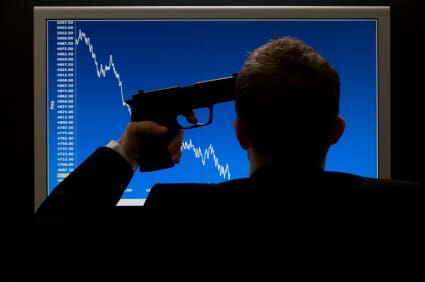 Each seminar and book will disclose to you that controlling your feelings and have taught in your trading are fundamental to your prosperity. In any case, nobody reveals to you how to accomplish passionate control and individual teachers while trading the market. Each trader sees the market distinctively in light of the fact that our past, our present lives, and our discernments are special. Understanding those things about yourself and tackling their impact on your trading will enable you to continue trading substances free of enthusiastic flotsam and jetsam. Here are a few stages that will have any kind of effect. You should adopt a specialized strategy to your feelings and teach preparing similarly as you adopt a specialized strategy to dissecting a stock outline. However, before we get into the coordination of how to control feelings, you should see a few rudiments of why some market members have strong control of their feelings while others don’t. Experience considerable difficulties recently? Is it true that you are getting a handle on worried about it? Assuming this is the case, you may find that a lot of the proposals you ordinarily get to enable you to the center are not doing a mess of good. You have been adhering to your trading technique as well as can be expected and endeavoring to trade with train, yet things still are not working out. You continue losing trades in any case, and you have a feeling that your entire basic leadership handle is a wreck.
Each seminar and book will disclose to you that controlling your feelings and have taught in your trading are fundamental to your prosperity. In any case, nobody reveals to you how to accomplish passionate control and individual teachers while trading the market. Each trader sees the market distinctively in light of the fact that our past, our present lives, and our discernments are special. Understanding those things about yourself and tackling their impact on your trading will enable you to continue trading substances free of enthusiastic flotsam and jetsam. Here are a few stages that will have any kind of effect. You should adopt a specialized strategy to your feelings and teach preparing similarly as you adopt a specialized strategy to dissecting a stock outline. However, before we get into the coordination of how to control feelings, you should see a few rudiments of why some market members have strong control of their feelings while others don’t. Experience considerable difficulties recently? Is it true that you are getting a handle on worried about it? Assuming this is the case, you may find that a lot of the proposals you ordinarily get to enable you to the center are not doing a mess of good. You have been adhering to your trading technique as well as can be expected and endeavoring to trade with train, yet things still are not working out. You continue losing trades in any case, and you have a feeling that your entire basic leadership handle is a wreck.
Trading Emotion is Required to Understand Market Vibrations
All value activity in stocks is fundamentally reliant on enthusiastic responses from differing market members. Without feelings, cost sits level. There are numerous degrees of passionate surges, influxes of happiness and covetousness, and floods of frenzy and sadness that drive costs up or down. What’s more, dependable inside those waves are the executioner tear tides that originate from the individuals who have figured out how to control feelings and wipe out the individuals who don’t have control. At last, achievement in the market is a mix of foreseeing the following move and the moves of the various market members who may enter that stock, and decide when you ought to take an interest. Shockingly, most traders trade the market not as though they were playing chess with the many-sided quality of the game of poker. However, they were in Las Vegas, betting on a roulette wheel. On occasion this way, you now and then need to handle the intense subject matters which are throwing you off track before you begin managing specialized parts of the circumstance. Possibly you are making blunders with your trading framework and how you utilize your pointers, yet you might not be able to settle those mistakes in your present mental state. You just can’t see obviously when your brain is a jumble of enthusiastic debris. In the event that that is your circumstance, I prescribe that you went through an enthusiastic agenda before you proceed. You should recognize any enthusiastic injuries which might be meddling in your trading, and afterward, make sense of regardless of whether those injuries are no less than one reason for your present issues. In the realm of stock trading, there are Master Traders who have control over their feelings and after that, there are the Gambler traders who purchase and offer construct absolutely with respect to feeling whether they understand it or not. A Master Trader joins the expertise of a chess player who envisions a rival’s moves and plans his own particular well ahead of time and furthermore utilizes the poker player’s reign in never uncovering his hand he uncovers it. A card shark is basically responding to his feelings without rationale or thinking ahead in what he does. Market members who trade the market with the ability of a Master Chess Player–anticipating value activity days, weeks, and months ahead of time; fusing the ‘never uncover your hand’ part of poker–have the extraordinary favorable position over speculator traders. They have control over their feelings and thus control over how they trade. The card shark trader is simply tossing money at the market and trusting something will go their direction. (more…)

 Trading is an interesting field to say the least. It revolves around a great deal of decision making, and a lot of choices which will have diverse effects. What is responsible for the decisions made? Naturally, the trader’s thoughts and considerations in relation to his or her trading experience. So, to a certain extent neuroscience comes into the picture.
Trading is an interesting field to say the least. It revolves around a great deal of decision making, and a lot of choices which will have diverse effects. What is responsible for the decisions made? Naturally, the trader’s thoughts and considerations in relation to his or her trading experience. So, to a certain extent neuroscience comes into the picture.
 Being perfect is certainly not easy. Perfection is debatable, and needless to say, as challenging as can be. Matters become increasingly difficult when this is attributed to a trading environment or situation. Many traders end up setting their trades by focusing on what they want the results to be. They focus on the outcome of the trade, and do not give a lot of attention to the actual execution of that trade. This is in fact one of the main reasons why trading is so difficult. A trader can never hope to be perfect in his or her decisions. And, one can never hope for a perfect scenario, where any decision that is made results in a favorable result. Therefore the general rule of thumb that traders need to appreciate and get used to is that they need to perfect the decision making process and the execution of the trade, rather than hoping to make the results perfect. The choices, research, knowledge and information discerned are the steps that need to be perfected in the hope of perfecting the results of the trade in question.
Being perfect is certainly not easy. Perfection is debatable, and needless to say, as challenging as can be. Matters become increasingly difficult when this is attributed to a trading environment or situation. Many traders end up setting their trades by focusing on what they want the results to be. They focus on the outcome of the trade, and do not give a lot of attention to the actual execution of that trade. This is in fact one of the main reasons why trading is so difficult. A trader can never hope to be perfect in his or her decisions. And, one can never hope for a perfect scenario, where any decision that is made results in a favorable result. Therefore the general rule of thumb that traders need to appreciate and get used to is that they need to perfect the decision making process and the execution of the trade, rather than hoping to make the results perfect. The choices, research, knowledge and information discerned are the steps that need to be perfected in the hope of perfecting the results of the trade in question.